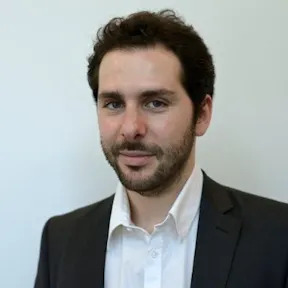 Rafael Tyszblat, Connecting Actions/European Institute for Dialogue
Rafael Tyszblat, Connecting Actions/European Institute for Dialogue
At DePaul, virtual exchange is known and experienced primarily through our Global Learning Experience (GLE), a successful and award winning program that has served over 4000 DePaul students over the past ten years. Virtual Exchange is defined as a learning practice in which educators intentionally design and support technology-mediated learning experiences. These experiences involve learners who are geographically separated and/or coming from different cultural settings, and implement multiple opportunities for sustained communication and/or collaboration among learners. Learning outcomes are clearly defined and include explicit outcomes in the area of intercultural awareness and/or competency.
At the annual Consular Corp luncheon, held on April 24, 2024, the audience heard a passionate advocacy for virtual exchange from the keynote speaker, Rafel Tyszblat. Rafael joined DePaul during the month of May 2024 as a Practitioner in Residence at the Grace School of Diplomacy and has engaged with a myriad constituents on campus, from higher administration to the student groups involved in the recent encampment. He is an experienced facilitator of intercultural dialogues, founded two different organizations devoted to interfaith and inter-convictional dialogue and is affiliated with Soliya, an organization devoted to creating spaces where young people around the world learn to listen to one another. In the words of Soliya’s founders:
Everyone’s story deserves to be told — and heard. That is why we connect people in conversation, enabling them to share their personal journeys and engage with and across difference. We are here to eliminate the idea of ‘the other’ so that we can thrive in this 21st Century society — together.
In a recent interview with David Wellman, Director of the Grace School of Applied Diplomacy, Rafael expanded on the idea of an inter-convictional framework as the broadest frame to structure authentic dialogues among humans. Not every person on the planet has religious beliefs or identifies strongly with a faith tradition, but each one of us has deep convictions on important, critical issues dealing with life's important questions. Different convictions then coalesce in part of our identity, and group identity is at the root of most conflicts in the world today. In his keynote address, Rafael also expanded on the importance of authentic dialogue, not as a superficial attempt at smoothing over conflicts, but as a powerful tool to ensure that people truly listen to one another and learn to recognize and embrace differences in peaceful and productive ways that focus on needs to be met versus abstract wishes.
The audience at the Consular Corp luncheon was very visibly affected by the power of the address. Rafael’s emphasis on the power of virtual exchange as a tool to structure and implement effective dialogues was very reaffirming for DePaul’s Global Engagement and our current commitment to GLE as a key element of our portfolio. Through GLE projects, DePaul faculty and students strive to create international connections that, as Rafael argues, foster dialogue and peace. If you want to learn more about GLE, please go to
http://go.depaul.edu/gle. To see examples of GLE projects, visit
http://go.depaul.edu/gleprojects.